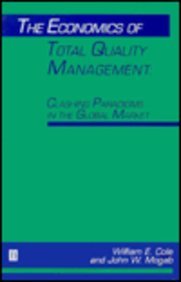Dimensions in total quality
1 total work
The Economics of Total Quality Management
by William Cole and John W. Mogab
Published 16 February 1995
This text traces the economic impact of total quality management (TQM). "The Economics of Total Quality Management" should be useful as a supplement for courses in managerial economics, macroeconomics, microeconomics, international business, and economic development while also appealing to the general business management market. It analyzes the global competition in which many of the leading firms have featured total quality management. Simple economic models are used to highlight the advantages of TQM over the mass production - scientific management paradigm. Throughout, the authors trace the economic implications of the total quality management concepts that have been the focus of heated discussion in business and engineering circles. These include "just in time" manufacturing, "lean manufacturing", customer value creation, flexible manufacturing, quality control, and bottom-up decision making. The genesis of the book is the success of the Japanese firm in the global marketplace. It begins by contrasting the managerial and organizational characteristics of the Japanese style continuous improvement firm (CIF) with those of the mass production/scientific management (MP/SM) firm.
There is also a presentation of the crucial role of economics in the MP/SM paradigm and a demonstration of the shortcomings of the textbook models for analysis of the CIF.
There is also a presentation of the crucial role of economics in the MP/SM paradigm and a demonstration of the shortcomings of the textbook models for analysis of the CIF.
